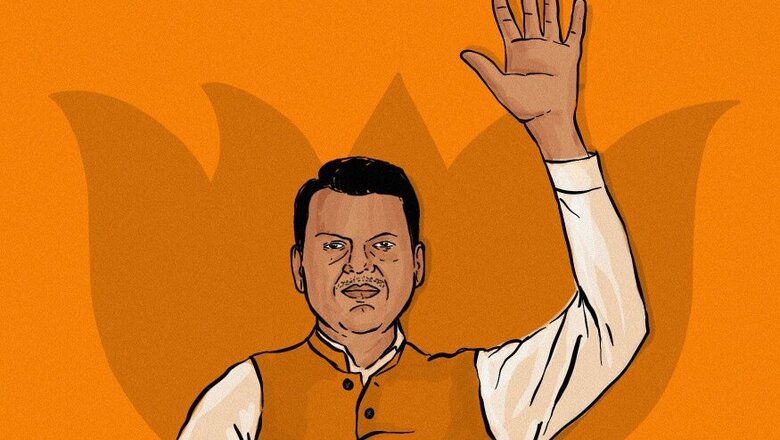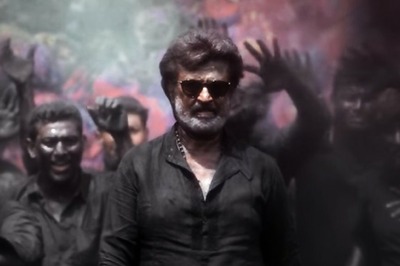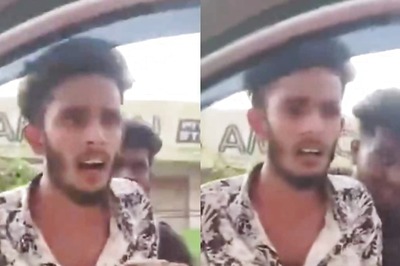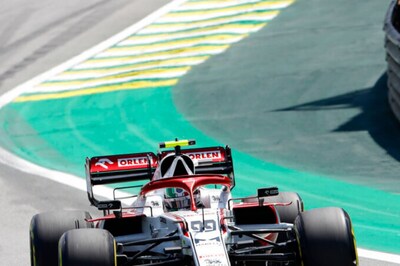
views
There is a saying in Marathi, which when translated in English means: “Turn the ‘bhakri’ (unleavened bread made of sorghum or bajra -- part of traditional Maharashtrian cuisine) when it is being cooked, or it will burn.”
This phrase is often used in politics to justify the easing out of veterans for fresh faces. However, a cook with even rudimentary culinary skills will agree that turning the ‘bhakri’ too soon may lead to it being left half-baked.
So, will the Bharatiya Janata Party’s (BJP) decision to ditch veterans for fresh faces while announcing its nominations to the Maharashtra Legislative Council lead to a similar situation?
While rejecting the claims of established names like former ministers Eknath Khadse, Vinod Tawde, Pankaja Munde (the daughter of late BJP veteran Gopinath Munde), and Chandrashekhar Bavankule, it has instead nominated a new crop of leaders.
This also indicates that despite disgruntlement at his style of functioning, former Chief Minister and incumbent Leader of Opposition Devendra Fadnavis, is firmly in the saddle.
All four nominees -- Gopichand Padalkar, Pravin Datke, Ranjitsinh Mohite Patil and Dr Ajit Gopchade -- are said to be loyal to Fadnavis, who also had his way when his man, Pravin Darekar was chosen as the Leader of Opposition in the Legislative Council.
It is no co-incidence that at least two of the leaders who were in the fray for the nomination -- Khadse and Pankaja -- were seen as Fadnavis’ rivals for the chief minister’s post and are at odds with him.
While Khadse had confirmed that he had sought a seat in the Upper House of the Legislature, it was also claimed that Pankaja could be the Leader of Opposition replacing Darekar after being elected to the council.
Fadnavis loyalists claim the four nominees are part of the BJP’s larger project to nurture an alternate leadership among the dominant Marathas and OBCs.
Padalkar, who belongs to the Dhangar (shepherd) community, had contested the recent Lok Sabha elections from Sangli as a candidate of Prakash Ambedkar’s Vanchit Bahujan Aghadi (VBA), and secured over three lakh votes.
He then joined the BJP and unsuccessfully fought the Assembly polls from Baramati against incumbent Deputy Chief Minister and NCP leader Ajit Pawar.
Dhangars are said to account for the second-largest percentage of votes in Maharashtra, next to the dominant Maratha-Kunbi caste cluster. However, they lack representative political representation in the Legislature and Parliament.
The BJP has to rely on its ally Mahadev Jankar of the Rashtriya Samaj Party (RSP) for Dhangar votes, and hence, may be looking at Padalkar, who was associated with controversial Hindutva demagogue Sambhajirao Bhide ‘Guruji,’ to deliver the goods.
The BJP has another Gordian knot to untie. Before coming to power in 2014, the party had promised to approve the demand of the Dhangars for inclusion in the Scheduled Tribes (ST) category.
However, this had fallen foul of the tribals and failed to meet legal requirements. Co-opting Padalkar, who was incidentally with the BJP, before switching to the VBA, may be aimed at offsetting a part of this anger.
Ranjitsinh Mohite Patil, the son of former deputy chief minister Vijaysinh Mohite Patil, is a former Rajya Sabha MP.
Though their authority has seen a decline since the days when they held sweeping authority over the region, the Mohite Patils, who are Marathas, still wield influence in parts of Solapur in western Maharashtra.
Datke, a hardcore Fadnavis man, is a former mayor of Nagpur like his leader. Hailing from a family with strong Rashtriya Swayamsevak Sangh (RSS) links, Datke belongs to the OBC Bari community, which has sizeable numbers in parts of eastern Vidarbha.
The dark horse, Gopchade, is a medical practitioner, and belongs to the Veershaiva-Lingayat community, which has a presence in parts of Maharashtra like Marathwada and western Maharashtra.
A senior BJP leader said there was anger in the rank-and-file as Padalkar and Mohite Patil, who were recent entrants to the party, were chosen over the claims of “loyalists.”
Some upset leaders are also said to be coalescing around the faction loyal to Union Minister Nitin Gadkari, who is at odds with the Fadnavis camp.
Fadnavis, who emerged as the dark horse for the chief minister’s position in 2014, and held almost undisputed sway over the government and party for five years, is accused of rubbing many in the wrong way while exercising his authority.
Murmurs against Fadnavis’ style of functioning, which became louder after ally Shiv Sena broke off to form the government with the Congress and NCP, may now get shriller.
“There is immense disgruntlement in the BJP at those with little contribution to the party being chosen for key positions in the recent past. It is obvious that sooner or later, we will have to pay the price. Pankaja’s claim was turned down on grounds that she lost the recent Assembly polls, but the same logic has not been applied for Padalkar,” said a leader, claiming that these decisions could affect the party’s social base.
As against Fadnavis, who is a Brahmin, Pankaja and Khadse are ‘Bahujans’ (non-Brahmins) and belong to the OBC category. The OBCs, a conglomeration of around 500 classes and communities across religious denominations, form around 53% of Maharashtra’s population.
The BJP, and its previous avatar, the Jan Sangh, were seen as a party of the cultural, urban and social elite, namely, Brahmins and mercantile communities, before senior leader, late Vasantrao Bhagwat launched a social engineering project to take it to the masses.
Bhagwat mentored leaders like the late Pramod Mahajan, his brother-in-law Gopinath Munde, and others to expand the BJP’s base.
Today, despite the BJP being seen as a party with a dominant Brahmanical culture, the bedrock of its base in Maharashtra lies in the ‘Madhav’ (Mali, Dhangar, Vanjari) combination, with the extra ‘M’ being thrown in to denote a section of dominant Marathas.
While Pankaja is a Vanjari, a community that has a strong presence in Marathwada and parts of Vidarbha and western Maharashtra, Khadse belongs to the Leva Patil community, which has strong pockets in north Maharashtra.
Pankaja, who was the rural development minister in the Fadnavis government, faced a shock-defeat from Parli in Beed, against her estranged cousin and Nationalist Congress Party (NCP) leader Dhananjay Munde, who is the Social Justice Minister in the Uddhav Thackeray-led coalition.
Her loyalists allege that Pankaja’s defeat in her father’s stronghold was an inside job. That Fadnavis is friends with Dhananjay since their days in the BJP, has not helped matters.
Khadse, who never made any bones of his disgruntlement at being edged out by his junior to become the chief minister, had resigned as the revenue minister after a sudden rush of controversies and media reports.
He was denied a nomination from his traditional Muktainagar seat in Jalgaon. His daughter Rohini Khadse-Khewalkar, who was nominated instead, lost by a narrow margin to a Shiv Sena rebel, who Khadse’s loyalists allege, was helped by elements in the BJP.
Khadse was at odds with former water resources minister and Fadnavis loyalist Girish Mahajan, who too hails from Jalgaon.
Bavankule, the energy and state excise minister under Fadnavis, was denied a renomination from his constituency of Kamthi in Nagpur, something that BJP leaders admit, cost them the votes of his powerful Teli community, in large parts of Vidarbha.
Significantly, both Pankaja and Khadse had threatened to unfurl the banner of revolt against the BJP and Fadnavis last year. Pankaja had announced a state-wide yatra, and also resigned from the BJP’s core committee, while Khadse had indicated that he would quit the party sooner or later. But, they pulled back at the last moment
Friday’s nominations have left Fadnavis loyalists gloating. They claim that these developments show that their leader is still calling the shots in the party’s Maharashtra unit, and remains in the good books of the BJP’s all-powerful central leadership.
But, this is contested by those from the rival camp. “Fadnavis is ruling the roost because those opposed to him have fallen in line with the party’s discipline and chose not to approach the central leadership with their grievances. The high-command in turn, feels that things are hunky-dory, despite the fact that our social and political base is eroding over the past few months,” a leader said.
So, coming back to the analogy, will the BJP manage to cook its ‘bhakri’ well? Or will it crumble? Wait and watch, say old BJP hands.


















Comments
0 comment